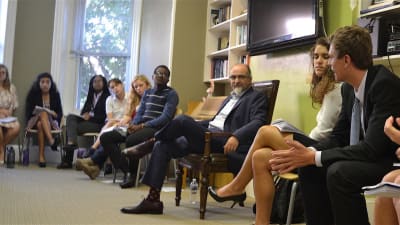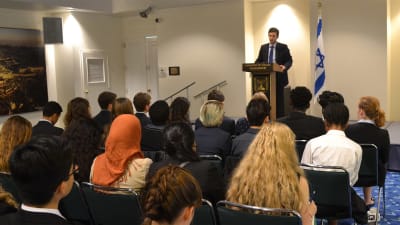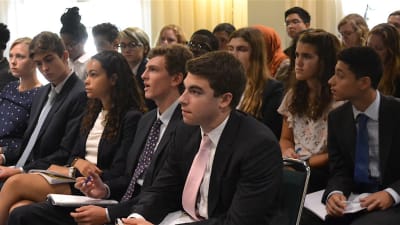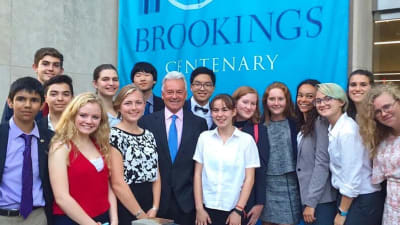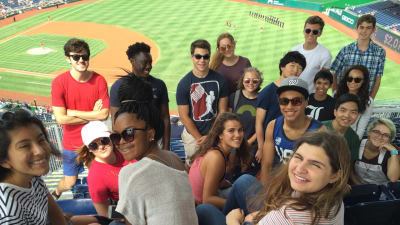Israelis, Palestinians, and Fall 2016
The Israeli-Palestinian Conflict is perhaps the greatest of all modern international challenges. Not only is it perniciously intractable; it also influences countless related contemporary problems. Leaders of the past and present have worked to address it, with limited success. This week our cohort took its turn, with promising results.
Following a brief overview of the conflict (is such a thing possible with loaded language and divergent narratives looming on all sides?), we welcomed our first guest speaker.
Ghaith al-Omari, former Executive Director of the [American Task Force on Palestine and current senior fellow at The Washington Institute for Near East Policy, has a long history as a top Palestinian negotiator. (He is also the 2015 SEGL Golden Mug Award winner!) Al-Omari was at the table for the Palestinians during the Camp David II negotiations and the Taba talks, served as Director of the International Relations Department in the Office of the Palestinian President, and worked as an advisor to Palestinian leader Mahmoud Abbas. His thoughts, delivered in the organized prose of an Oxford-educated lawyer (as he is), made students think hard. Is it better to curse setbacks in the peace process, or do setbacks only underscore the importance of staying engaged? What is the best way for college students to work on this issue? Is it ever right to respond with emotion, or is it better to ask oneself “Will this advance the cause of peace?” before reacting with anger?
On Friday morning, we took an early Metro ride up Connecticut Avenue to visit the Israeli Embassy. There the students got an insider’s view of the conflict from Jack Sztrigler, Director of Strategic Outreach at the Embassy. The students left these visits with a deeper appreciation for the complexity of the situation, the effect of the conflict on the Israeli people and government, as well as a greater understanding of the role of international diplomats in promoting and bridging different points of view.
Later this semester, we plan to visit the Woodrow Wilson Center and meet with the experienced negotiator, advisor, and academic Aaron David Miller. Miller, was at the table for the United States during the 2000 Camp David II negotiations and has counseled six Secretaries of State. This third viewpoint rounds out our case study.
The points of view we heard this week (and will hear later this term) are only a few on a vibrant spectrum. These perspectives, however, gave plenty of fodder for student conversation. How important is honoring opposing narratives in resolving conflict? Are negotiations the best strategy going, forward? If not, what is the best strategy? If so, how do we ensure they are successful? These are just a few of the topics our students proposed for reflection.
Outside of Ethics and Leadership class, our students are learning a great deal, too. For example, on Sunday (the 15th anniversary of September 11th), we attended a Washington Nationals baseball game–which included a tribute to the victims and survivors of September 11th, and a group of students chose to attend an interfaith “Unity Walk” that visited area houses of worship around the city. On Wednesday, our Comparative Government and Politics class (along with a few classmates) visited the Brookings Institution (just right around the corner from our Academic building for a conversation with Alan Duncan, MP, the current UK Minister of State for Foreign and Commonwealth Affairs. “Conversation” was the right word as three SEGL students were able to ask questions in the Q&A section of the event, earning chuckles from the crowd and praise from Mr. Duncan (see a picture from his Twitter feed below!). The next night we listened to former Attorney General Mike Mukasey at the American Enterprise Institute (even closer to us than Brookings!). After he spoke, Mukasey found himself surrounded by another enterprising group of SEGL students who peppered him with questions.
Next up: our speechwriting case study with longtime top Hillary Clinton speechwriter Lissa Muscatine!
